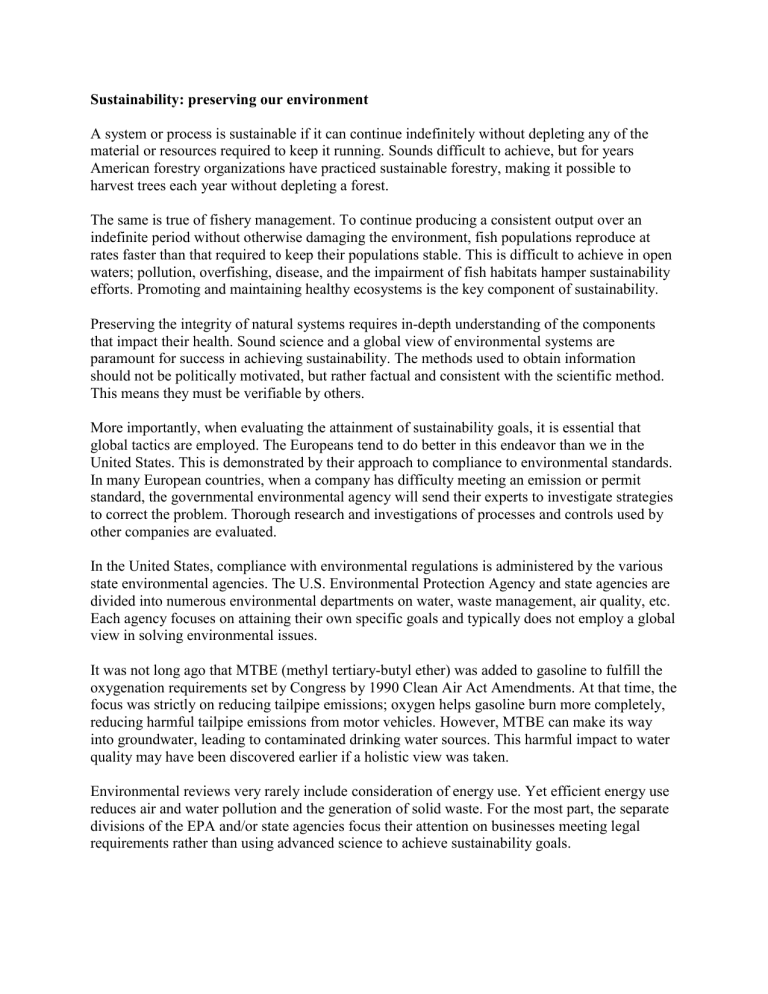Preserving our environment - Watershed Alliance of Adams County

Sustainability: preserving our environment
A system or process is sustainable if it can continue indefinitely without depleting any of the material or resources required to keep it running. Sounds difficult to achieve, but for years
American forestry organizations have practiced sustainable forestry, making it possible to harvest trees each year without depleting a forest.
The same is true of fishery management. To continue producing a consistent output over an indefinite period without otherwise damaging the environment, fish populations reproduce at rates faster than that required to keep their populations stable. This is difficult to achieve in open waters; pollution, overfishing, disease, and the impairment of fish habitats hamper sustainability efforts. Promoting and maintaining healthy ecosystems is the key component of sustainability.
Preserving the integrity of natural systems requires in-depth understanding of the components that impact their health. Sound science and a global view of environmental systems are paramount for success in achieving sustainability. The methods used to obtain information should not be politically motivated, but rather factual and consistent with the scientific method.
This means they must be verifiable by others.
More importantly, when evaluating the attainment of sustainability goals, it is essential that global tactics are employed. The Europeans tend to do better in this endeavor than we in the
United States. This is demonstrated by their approach to compliance to environmental standards.
In many European countries, when a company has difficulty meeting an emission or permit standard, the governmental environmental agency will send their experts to investigate strategies to correct the problem. Thorough research and investigations of processes and controls used by other companies are evaluated.
In the United States, compliance with environmental regulations is administered by the various state environmental agencies. The U.S. Environmental Protection Agency and state agencies are divided into numerous environmental departments on water, waste management, air quality, etc.
Each agency focuses on attaining their own specific goals and typically does not employ a global view in solving environmental issues.
It was not long ago that MTBE (methyl tertiary-butyl ether) was added to gasoline to fulfill the oxygenation requirements set by Congress by 1990 Clean Air Act Amendments. At that time, the focus was strictly on reducing tailpipe emissions; oxygen helps gasoline burn more completely, reducing harmful tailpipe emissions from motor vehicles. However, MTBE can make its way into groundwater, leading to contaminated drinking water sources. This harmful impact to water quality may have been discovered earlier if a holistic view was taken.
Environmental reviews very rarely include consideration of energy use. Yet efficient energy use reduces air and water pollution and the generation of solid waste. For the most part, the separate divisions of the EPA and/or state agencies focus their attention on businesses meeting legal requirements rather than using advanced science to achieve sustainability goals.
Although slow in coming, there are signs that EPA is embracing the broader, more global concept of sustainability. Recent greenhouse gas initiatives are targeting the importance of energy management as an effective tool in reducing pollutants. Also, the LEED (Leadership in
Energy and Environmental Design) building program has promoted designs that reduce a building’s environmental impact on the community.
To solve the complex environmental issues sound, science and a holistic view of our environment is necessary. Striving to attain sustainability should prove more successful in preserving our environmental than just strictly complying with regulations.
Phyllis Chant is a member of the Board of the Watershed Alliance of Adams County; she is employed by Glatfelter Paper Company, Spring Grove, Pa. WAAC’s web address is
AdamsWatersheds.org.








